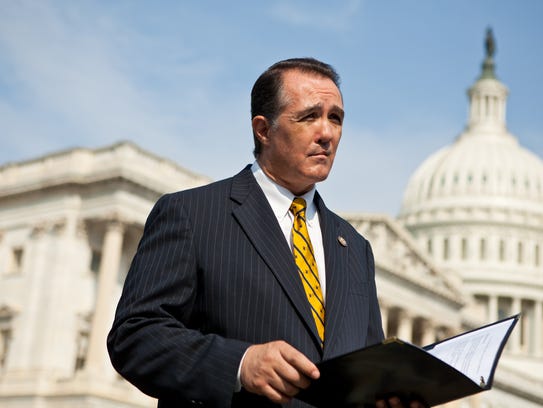Here's a look at eight GOP House members whose votes will be crucial in deciding the outcome.
Charlie Dent of Pennsylvania
Rep. Charlie Dent, R-Pa. (Photo: J. Scott Applewhite, AP)
Dent, a co-chairman of the moderate Tuesday Group, has been especially concerned about the tax credits the bill offers to help low-income Americans buy insurance. He has said that the credits, which would replace a more generous federal subsidy provided by Obamacare, are not big enough to help people pay their insurance premiums. House leaders changed the bill to pave the way for the Senate to increase tax credits for older Americans facing higher premiums, but Dent would prefer to see bigger credits in the House bill first. Thursday morning Dent said on MSNBC that he has decided to vote against the bill.
Peter King of New York
Rep. Peter King, R-N.Y. (Photo: Jack Gruber, USA TODAY)
The moderate congressman went from a "no" to an "undecided" after lobbying from Trump this week. Trump reportedly pointed to King during a meeting with House Republicans and said, "You're going to be with me, right?" King said he didn't answer the president. King has said that the bill would cost his state billions of Medicaid dollars. He also expressed concern Wednesday about how it might affect people who need cancer-fighting medication. Nearly 3 million New York residents could lose health insurance under the GOP bill, Gov. Andrew Cuomo has said.
Mark Amodei of Nevada
Rep. Mark Amodei, R-Nev. (Photo: Jocelyn M. Augustino for USA TODAY)
Amodei, the only Republican elected to the House from Nevada, remained undecided about how to vote after Trump's meeting with House GOP members on Tuesday. The congressman was seeking changes to the bill Wednesday that would tie tax cuts for insurance companies to reductions in premiums for consumers and exempt residents of counties with only one insurance provider from having to pay a penalty if they have a gap in their insurance coverage. Residents of 10 Nevada counties have only one provider in the individual market.
Trent Franks of Arizona
Rep. Trent Franks, R-Ariz. (Photo: Brendan Hoffman, Getty Images)
He is one of the most ardent anti-abortion conservatives in the House, and said "I haven't been able to get to yes yet" on the bill because he is not convinced that anti-abortion provisions will stay in the legislation. Moderate Republicans in the Senate oppose provisions that would defund Planned Parenthood. Also, a provision that would bar low-income Americans from using tax credits to buy insurance that includes abortion services may not survive in the Senate.
Steve Pearce of New Mexico
Rep. Steve Pearce, R-N.M. (Photo: USA TODAY)
The congressman remained undecided Wednesday but has expressed concerns about how the bill would affect the ability of his constituents to afford health insurance. New Mexico was one of 31 states that expanded Medicaid under Obamacare. The state is already struggling to maintain its share of funding for the program, and the Republican bill could shift even more of those costs to the states.
Alex Mooney of West Virginia
Rep. Alex Mooney, R-W.Va. (Photo: J. Scott Applewhite, AP)
The two-term congressman said in a statement Wednesday that he was still evaluating the bill, listening to his constituents and looking to see if there would be any last-minute changes to the legislation. He has been listed in various news reports as both "leaning for" and "leaning against" the bill, but he has not given a definitive answer on how he will vote.
Darrell Issa of California
Rep. Darrell Issa, R-Calif. (Photo: Justin Sullivan, Getty Images)
Issa, who narrowly won re-election last year in his Democratic-leaning district, told reporters Tuesday that he was "leaning yes" on the bill after GOP leaders announced changes to the legislation. Those changes included provisions to pave the way for the Senate to increase the tax credits that low-income and moderate-income people could use to buy health insurance.
Joe Barton of Texas
Rep. Joe Barton, R-Texas (Photo: Evan Vucci, AP)
The conservative congressman has described himself as "a friendly lean no" on the bill. He has pushed to freeze Medicaid expansion two years earlier than called for in the legislation. The bill would phase out Medicaid expansion by 2020, but Barton and other conservatives are pushing for it to stop next year.
http://www.usatoday.com/story/news/...7IFhvHkoFaNTkvhFljZ1nbiAU1wk0g&_hsmi=48997621

 fukk em let em get with they Voted for
fukk em let em get with they Voted for and keep hustling.
and keep hustling. There's a silver lining as well.
There's a silver lining as well.










 These people still think they are part of it man. Think its on code. The dollar is the only race these fukkers care about.
These people still think they are part of it man. Think its on code. The dollar is the only race these fukkers care about.